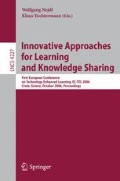Abstract
There are specific sectors of the economy that can benefit from satellite-based tele-education. Areas, such as maritime and agriculture, share common needs for both broadband connectivity at remote geographical areas that cannot otherwise be covered, and for innovative content for tele-education purposes. Furthermore, each area has special requirements with regard to the type of content to be delivered. In this paper we propose a set of architectural designs and case scenarios that will realise such interactive end-to-end education systems based on satellite communications. Services requirements in this setting are also identified and discussed.
Access this chapter
Tax calculation will be finalised at checkout
Purchases are for personal use only
Preview
Unable to display preview. Download preview PDF.
References
Urdan, T., Weggen, C.: Corporate E-Learning: Exploring a New Frontier (accessed on April 3, 2006), http://www.spectrainteractive.com/pdfs/CorporateELearingHamrecht.pdf
Hambrech, W.R.: Corporate e-Learning: Exploring a new Frontier (accessed on April 3, 2006), http://www.learnchamp.com/upload/e-Learning_Exploring_New_Frontier.pdf
Koskinen, T., Stergioulas, L.K., Denoual, Y.: European Roadmap for Professional e-Training, Barcelona (2004)
Stergioulas, L.K., Kamtsiou, V., Koskinen, T.: A roadmapping framework for technology-enhanced professional training. In: Proceedings of the 8th IFIP World Conference on Computers in Education (WCCE 2005), Cape Town, South Africa, July 4-7 (2005)
Santos, M.: Tendencias en la formación con medios digitales: el e-Learning (accessed April 3, 2006), http://www.unav.es/digilab/ric/textos/e_learning.html
Isabel: Isabel Technical Documentation (accessed on April 12, 2006), available on: http://www.agora-2000.com/products/isabel/documentation.html
Netmeeting: Microsoft Netmeeting Features (accessed on 12 April 2006), available at: http://www.microsoft.com/windows/NetMeeting/Features/default.ASP
Author information
Authors and Affiliations
Editor information
Editors and Affiliations
Rights and permissions
Copyright information
© 2006 Springer-Verlag Berlin Heidelberg
About this paper
Cite this paper
Serif, T. et al. (2006). Satellite-Enabled Interactive Education: Scenarios and Systems Architectures. In: Nejdl, W., Tochtermann, K. (eds) Innovative Approaches for Learning and Knowledge Sharing. EC-TEL 2006. Lecture Notes in Computer Science, vol 4227. Springer, Berlin, Heidelberg. https://doi.org/10.1007/11876663_32
Download citation
DOI: https://doi.org/10.1007/11876663_32
Publisher Name: Springer, Berlin, Heidelberg
Print ISBN: 978-3-540-45777-0
Online ISBN: 978-3-540-46234-7
eBook Packages: Computer ScienceComputer Science (R0)

